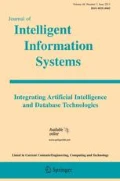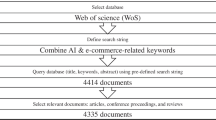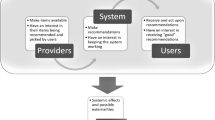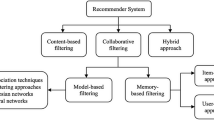Abstract
The act of reading has benefits for individuals and societies, yet studies show that reading declines, especially among the young. Recommender systems can help stop such decline. We present a survey of recommender systems in the domain of books. We have categorized the systems into six classes, and highlighted the main trends, issues, evaluation approaches and datasets. Other research areas, such as psychology, are consulted to understand users’ books choices and reading models.
Similar content being viewed by others
Notes
In a closed dataset, the rating matrix has no missing values: every user rates every book.
An Amazon service selling audiobooks: http://www.audible.com
References
Agrawal, R., & Srikant, R. (1994). Fast algorithms for mining association rules in large databases. In Proceedings of the 20th international conference on very large data bases, VLDB ’94 (pp. 487–499). San Francisco: Morgan Kaufmann Publishers Inc.
Ahn, H.J. (2008). A new similarity measure for collaborative filtering to alleviate the new user cold-starting problem. Information Sciences, 178(1), 37–51.
Alharthi, H., Inkpen, D., & Szpakowicz, S. (2017). Unsupervised topic modelling in a book recommender system for new users. In Proceedings of the 40th international ACM SIGIR conference on research and development in information retrieval, SIGIR’17. New York: ACM.
Ardanuy, M.C., & Sporleder, C. (2015). Clustering of novels represented as social networks. LiLT (Linguistic Issues in Language Technology), 12(4), 1–31.
Benkoussas, C., & Bellot, P. (2013). Book recommendation based on social information. In Working notes for CLEF 2013 conference (pp. 23–26). Valencia.
Bergamaschi, S., & Po, L. (2015). Comparing LDA and LSA topic models for content-based movie recommendation systems (pp. 247–263). Cham: Springer International Publishing.
Berns, G.S., Blaine, K., Prietula, M.J., & Pye, B.E. (2013). Short- and long-term effects of a novel on connectivity in the brain. Brain Connectivity, 3(6), 590–600.
Chen, Y.-F. (2008). Herd behavior in purchasing books online. Computers in Human Behavior, 24(5), 1977–1992. Including the Special Issue: Internet Empowerment.
Crespo, R.G., Martínez, O.S., Lovelle, J.M.C., García-Bustelo, B.C.P., Gayo, J.E.L., & Ordoñez de Pablos, P. (2011). Recommendation System based on user interaction data applied to intelligent electronic books. Computers in Human Behavior, 27(4), 1445–1449. Social and Humanistic Computing for the Knowledge Society.
Flach, P.A., & Lachiche, N. (2001). Confirmation-guided discovery of first-order rules with tertius. Machine Learning, 42(1/2), 61–95.
Garrido, A.L., Pera, M.S., & Sergio, I. (2014). SOLE-R A semantic and linguistic approach for book recommendations. In 2014 IEEE 14th international conference on advanced learning technologies (ICALT) (pp. 524–528).
Garrido, A.L., Buey, M.G, Escudero, S., Ilarri, S., Mena, E., & Silveira, S.B. (2013). TM-Gen: A topic map generator from text documents. In 2013 IEEE 25th international conference on tools with artificial intelligence (pp. 735–740).
Ghazi, D., Inkpen, D., & Szpakowicz, S. (2010). Hierarchical versus flat classification of emotions in text. In Proceedings of the NAACL HLT 2010 workshop on computational approaches to analysis and generation of emotion in text, CAAGET ’10. Association for Computational Linguistics (pp. 140–146). Stroudsburg.
Givon, S., & Lavrenko, V. (2009). Predicting social-tags for cold start book recommendations. In Proceedings of the third ACM conference on recommender systems, RecSys ’09 (pp. 333–336): ACM.
Gurini, D.F., Gasparetti, F., Micarelli, A., & Sansonetti, G. (2013). A sentiment-based approach to twitter user recommendation. In Proceedings of the fifth ACM RecSys workshop on recommender systems and the social web co-located with the 7th ACM conference on recommender systems (RecSys 2013) (p. 2013). Hong Kong.
Hahsler, M., Grün, B., & Hornik, K. (2005). arules – a computational environment for mining association rules and frequent item sets. JSS Journal of Statistical Software, 14(15), 1–25.
Hill, K. (2013). The arts and individual well-being in Canada. [Online; posted 13 February 2013].
Jawaheer, G., Szomszor, M., & Kostkova, P. (2010). Comparison of implicit and explicit feedback from an online music recommendation service. In Proceedings of the 1st international workshop on information heterogeneity and fusion in recommender systems, HetRec ’10 (pp. 47–51). New York: ACM.
Kapusuzoglu, H., & GunduzÖguducu, S. (2011). A relational recommender system based on domain ontology. In 2011 international conference on emerging intelligent data and web technologies (EIDWT) (pp. 36–41).
Keshtkar, F., & Inkpen, D. (2012). A hierarchical approach to mood classification in blogs. Natural Language Engineering, 18(1), 61–81.
Koberstein, J., & Ng, Y.-K. (2006). Using word clusters to detect similar Web documents. In Proceedings of the first international conference on knowledge science, engineering and management, KSEM’06 (pp. 215–228). Berlin: Springer.
Kompan, M., & Bieliková, M. (2010). Content-based news recommendation (pp. 61–72). Berlin: Springer.
Lahiri, S. (2014). Complexity of word collocation networks: a preliminary structural analysis. In Proceedings of the student research workshop at the 14th conference of the European chapter of the association for computational linguistics (pp. 96–105). Gothenburg: Association for Computational Linguistics.
Lee, J.S., & Lee, J.C. (2006). Music for my mood: A music recommendation system based on context reasoning. In Havinga, P., Lijding, M., Meratnia, N., & Wegdam, M. (Eds.) Smart sensing and context: first European conference, EuroSSC 2006 Enschede, Netherlands, 25-27, 2006 Proceedings (pp. 190–203). Berlin: Springer Berlin Heidelberg.
Lee, J., Sun, M., & Lebanon, G. (2012). A comparative study of collaborative filtering algorithms. CoRR, arXiv:1205.3193.
Linden, G., Smith, B., & York, J. (2003). Amazon.com recommendations: item-to-item collaborative filtering. IEEE Internet Computing, 7(1), 76–80.
Lops, P., Gemmis, M., & Semeraro, G. (2011). Content-based recommender systems: state of the art and trends. In Ricci, F., Rokach, L., Shapira, B., & Kantor, B. P. (Eds.) Recommender systems handbook (pp. 73–105). Boston: Springer US.
Maneewongvatana, S., & Maneewongvatana, S. (2010). A recommendation model for personalized book lists. In 2010 international symposium on communications and information technologies (ISCIT) (pp. 389–394).
Manning, C.D., Raghavan, P., & Schütze, H. (2008). Introduction to information retrieval. New York: Cambridge University Press.
Mar, R.A., & Oatley, K. (2008). The function of fiction is the abstraction and simulation of social experience. Perspectives on Psychological Science, 3(3), 173–192.
Mar, R.A., Oatley, K., & Peterson, J.B. (2009). Exploring the link between reading fiction and empathy: Ruling out individual differences and examining outcomes. Communications, 34(4), 407–428.
McAuley, J., & Leskovec, J. (2013). Hidden factors and hidden topics: understanding rating dimensions with review text. In Proceedings of the 7th ACM conference on recommender systems, RecSys ’13 (pp. 165–172). New York: ACM.
Mikawa, M., Izumi, S., & Tanaka, K. (2011). Book recommendation signage system using silhouette-based gait classification. In 2011 10th international conference on machine learning and applications and workshops (ICMLA) (Vol. 1, pp. 416–419).
Mikolov, T., Chen, K., Corrado, G., & Dean, J. (2013). Efficient estimation of word representations in vector space, CoRR, arXiv:1301.3781.
Mooney, R.J., & Roy, L. (2000). Content-based book recommending using learning for text categorization. In Proceedings of the fifth ACM conference on digital libraries, DL ’00 (pp. 195–204). New York: ACM.
Nagori, R., & Aghila, G. (2011). LDA based integrated document recommendation model for e-learning systems. In 2011 international conference on emerging trends in networks and computer communications (ETNCC) (pp. 230–233).
Noia, T.D., Ostuni, V.C., Tomeo, P., & Sciascio, E.D. (2016). SPrank: Semantic path-based ranking for top-n recommendations using linked open data. ACM Transactions on Intelligent Systems and Technology, 8(1), 9:1–9:34.
Pang, B., & Lee, L. (2008). Opinion mining and sentiment analysis. Found Trends Information Retrieval, 2(1-2), 1–135.
Pathak, D., Matharia, S., & Murthy, C.N.S. (2013). NOVA: Hybrid book recommendation engine. In 2013 IEEE 3rd international advance computing conference (IACC) (pp. 977–982).
Pazzani, M.J., & Billsus, D. (2007). Content-based recommendation systems. In Brusilovsky, P., Kobsa, A., & Nejdl, W. (Eds.) The adaptive web: methods and strategies of web personalization (pp. 325–341). Berlin: Springer Berlin Heidelberg.
Pearson, K. (1895). Note on regression and inheritance in the case of two parents. Proceedings of the Royal Society of London, 58, 240–242.
Pera, M.S. (2014). Using online data sources to make recommendations on reading materials for K-12 and advanced readers. Copyright – Copyright ProQuest, UMI Dissertations Publishing 2014; Last updated – 2015-08-21; First page – n/a.
Pera, M.S., Condie, N., & Ng, Y.-K. (2010). Personalized book recommendations created by using social media data. In Chiu, D. K. W., Bellatreche, L., Sasaki, H., Leung, H. F., Cheung, S.-C., Hu, H., & Shao, J. (Eds.) WISE workshops, volume 6724 of lecture notes in computer science (pp. 390–403). Springer.
Pera, M.S., & Ng, Y.-K. (2011). With a little help from my friends: generating personalized book recommendations using data extracted from a social website. In Proceedings of the 2011 IEEE/WIC/ACM international conferences on web intelligence and intelligent agent technology volume 01, WI-IAT ’11 (p. 9699). Washington: IEEE Computer Society.
Pera, M.S., & Ng, Y.-K. (2013). What to read next?: Making personalized book recommendations for K-12 users. In Proceedings of the 7th ACM conference on recommender systems, RecSys ’13 (pp. 113–120). New York: ACM.
Pera, M.S., & Ng, Y.-K. (2014a). Automating readers’ advisory to make book recommendations for K-12 readers. In Proceedings of the 8th ACM conference on recommender systems, RecSys ’14 (pp. 9–16). New York: ACM.
Pera, M.S., & Ng, Y.K. (2014b). How can we help our K-12 teachers?: using a recommender to make personalized book suggestions. In Proceedings of the 2014 IEEE/WIC/ACM international joint conferences on web intelligence (WI) and intelligent agent technologies (IAT) Volume 02, WI-IAT ’14 (p. 335342). Washington: IEEE Computer Society.
Pera, M.S., & Ng, Y.-K. (2015). Analyzing book-related features to recommend books for emergent readers. In Proceedings of the 26th ACM conference on hypertext & Social Media, HT ’15 (pp. 221–230). New York: ACM.
Pérez-González-de Martos, A, Silvestre-Cerda, JA, Rihtar, M, Juan, A, & Civera, J (2014). Using automatic speech transcriptions in lecture recommendation systems. In VIII Jornadas en Tecnología del Habla and IV Iberian SLTech Workshop (IberSpeech 2014).
Priyanka, K., Tewari, A.S., & Barman, A.G. (2015). Personalised book recommendation system based on opinion mining technique. In 2015 global conference on communication technologies (GCCT) (pp. 285–289).
Rahman, M.K.M., Yang, W. P., Chow, T.W.S., & Wu, S. (2007). A flexible multi-layer self-organizing map for generic processing of tree-structured data. Pattern Recognition, 40(5), 1406–1424.
Rajpurkar, S., Bhatt, D., & Malhotra, P. (2015). Book recommendation system. IJIRST–International Journal for Innovative Research in Science & Technology, 1(11), 314–316.
Rana, C., & Jain, S.K. (2012). Building a Book Recommender system using time based content filtering. WSEAS Transactions on Computers, 11(2), 27–33.
Ricci, F., Rokach, L., & Shapira, B. (2011). Introduction to recommender systems handbook. In Ricci, F., Rokach, L., Shapira, B., & Kantor, B. P. (Eds.) Recommender systems handbook (pp. 1–35). Boston: Springer US.
Riedl, J., Sanders, J., & Beaupre, T. (2009). Important research challenges in recommenders [panel at 3rd ACM Conference on Recommender Systems].
Ross, C.S. (2000). Making choices. The Acquisitions Librarian, 13(25), 5–21.
Ross, C.S. (2009). Reader on top: public libraries, pleasure reading, and models of reading. Library Trends, 57(4), 632–656.
Sarwar, B., Karypis, G., Konstan, J., & Riedl, J. (2001). Item-based collaborative filtering recommendation algorithms. In Proceedings of the 10th international conference on World Wide Web, WWW ’01 (pp. 285–295). New York: ACM.
Sase, A., Varun, K., Rathod, S., & Patil, D. (2015). A proposed book recommender system. International Journal of Advanced Research in Computer and Communication Engineering, 4(2), 481– 483.
Schutte, N.S., & Malouff, J.M. (2007). Dimensions of reading motivation development of an adult reading motivation scale. Reading Psychology, 28(5), 469–489.
Shani, G., & Gunawardana, A. (2011). Evaluating recommendation systems. In Ricci, F., Rokach, L., Shapira, B., & Kantor, B. P. (Eds.) Recommender systems handbook (pp. 257–297). Boston: Springer US.
Shepitsen, A., Gemmell, J., Mobasher, B., & Burke, R. (2008). Personalized recommendation in social tagging systems using hierarchical clustering. In Proceedings of the 2008 ACM conference on recommender systems, RecSys’08 (pp. 259–266). New York: ACM.
Sohail, S.S, Siddiqui, J., & Ali, R. (2013). Book recommendation system using opinion mining technique. In 2013 international conference on advances in computing, communications and informatics (ICACCI) (pp. 1609–1614).
Sohail, S.S., Siddiqui, J, & Ali, R. (2014). Ordered ranked weighted aggregation based book recommendation technique: A link mining approach. In 2014 14th international conference on hybrid intelligent systems (HIS) (pp. 309–314).
Stamatatos, E. (2009). A survey of modern authorship attribution methods. Journal of the American Society of Information Science and Technology, 60(3), 538–556.
Su, X., & Khoshgoftaar, T.M. (2009). A survey of collaborative filtering techniques. Advances in Artificial Intelligence, 2009, 4:2–4:2.
Tang, J., Hu, X., & Liu, H. (2013). Social recommendation: a review. Social Network Analysis and Mining, 3(4), 1113–1133.
Tkalċič, M., Burnik, U., Odić, A., Koṡir, A., & Tasiċ, J. (2013). Emotion-aware recommender systems – a framework and a case study. In Markovski, S., & Gusev, M. (Eds.) ICT Innovations 2012: secure and intelligent systems (pp. 141–150). Berlin: Springer Berlin Heidelberg.
Tsuji, K., Takizawa, N., Sato, S., Ikeuchi, U., Ikeuchi, A., Yoshikane, F., & Itsumura, H. (2014). Book recommendation based on library loan records and bibliographic information. In Procedia - social and behavioral sciences (pp. 478–486). 3rd International Conference on Integrated Information (IC-ININFO).
Vaz, P.C., de Matos, D.M., & Martins, B. (2012a). Stylometric relevance-feedback towards a hybrid book recommendation algorithm. In Proceedings of the fifth ACM workshop on research advances in large digital book repositories and complementary media, BooksOnline ’12 (pp. 13–16). New York: ACM.
Vaz, P.C., Martins de Matos, D., & Martins, B. (2012b). Improving a hybrid literary book recommendation system through author ranking. In Proceedings of the 12th ACM/IEEE-CS joint conference on digital libraries, JCDL ’12 (pp. 387–388). New York: ACM.
Vaz, P.C., Ribeiro, R., & de Matos, D.M. (2012c). LitRec vs. Movielens A comparative study. In KDIR 2012proceedings of the international conference on knowledge discovery and information retrieval (pp. 370–373). Barcelona, Spain.
Vaz, P.C., Ribeiro, R., & Martins de Matos, D. (2013). Book recommender prototype based on author’s writing style. In Proceedings of the 10th conference on open research areas in information retrieval, OAIR ’13 (pp. 227–228). Paris: Le centre de hautes études internationales d’informatique documentaire.
Vaz, P.C., Ribeiro, R., & Martins de Matos, D. (2013). Understanding temporal dynamics of ratings in the book recommendation scenario. In Proceedings of the 2013 international conference on information systems and design of communication, ISDOC ’13 (pp. 11–15). New York: ACM.
Vincent Greaney, S.B.N. (1990). The functions of reading: a cross-cultural perspective. Reading Research Quarterly, 25(3), 172–195.
Wang, C., & Blei, D.M. (2011). Collaborative topic modeling for recommending scientific articles. In Proceedings of the 17th ACM SIGKDD international conference on knowledge discovery and data mining, KDD ’11 (pp. 448–456). New York: ACM.
Wintrode, J., Sell, G., Jansen, A., Fox, M., Garcia-Romero, D., & McCree, A. (2015). Content-based recommender systems for spoken documents. In 2015 IEEE international conference on acoustics, speech and signal processing (ICASSP) (pp. 5201–5205).
Xu, R., Wang, Z., Xu, J., Chen, J., Lu, Q., & Wong, K.-F. (2015). An iterative emotion classification approach for microblogs. In Gelbukh, A. (Ed.) Computational linguistics and intelligent text processing: 16th international conference, CICLing 2015, Cairo, Egypt, Proceedings, Part II (pp. 104–113). Cham: Springer International Publishing.
Yang, X., Zeng, H., & Huang, W. (2009). ARTMAP-based data mining approach and its application to library book recommendation. In 2009 international symposium on intelligent ubiquitous computing and education (pp. 26–29).
Zeng, W., An, Z., Shang, M.-S., & Zhang, Y.-C. (2013). Information filtering in sparse online systems recommendation via semi-local diffusion. PLoS ONE, 8(11), 1–9, 11.
Zhang, H., Chow, T.W.S., & Wu, Q.M.J. (2016). Organizing books and authors by multilayer som. IEEE Transactions on Neural Networks and Learning Systems, 27 (12), 2537–2550.
Zhou, M. (2010). Book recommendation based on web social network. In 2010 international conference on artificial intelligence and education (ICAIE) (pp. 136–139).
Zhu, Z., & yan Wang, J. (2007). Book recommendation service by improved association rule mining algorithm. In 2007 international conference on machine learning and cybernetics (Vol. 7, pp. 3864–3869).
Ziegler, C.-N., McNee, S.M., Konstan, J.A., & Lausen, G. (2005). Improving recommendation lists through topic diversification. In Proceedings of the 14th international conference on World Wide Web, WWW ’05 (pp. 22–32). New York: ACM.
Ziegler, C.-N., McNee, S.M., Konstan, J.A., & Lausen, G. (2005). Improving recommendation lists through topic diversification. In Proceedings of the 14th international conference on World Wide Web, WWW ’05 (pp. 22–32). New York: ACM.
Acknowledgements
The first author receives support from the Saudi Electronic University. This work was also partially supported by the Natural Sciences and Engineering Research Council of Canada.
Author information
Authors and Affiliations
Corresponding author
Rights and permissions
About this article
Cite this article
Alharthi, H., Inkpen, D. & Szpakowicz, S. A survey of book recommender systems. J Intell Inf Syst 51, 139–160 (2018). https://doi.org/10.1007/s10844-017-0489-9
Received:
Revised:
Accepted:
Published:
Issue Date:
DOI: https://doi.org/10.1007/s10844-017-0489-9




